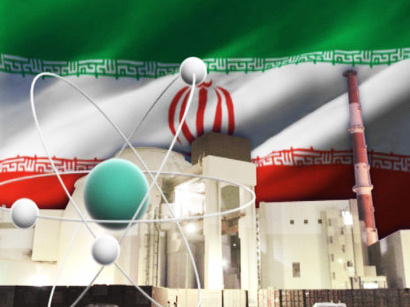EU upbeat on Iran nuclear issue after Rohani's election

By Sara Rajabova
After the inauguration of Iran's new President Hassan Rohani, some countries concerned over Iran's nuclear program expressed hope for further nuclear talks with Tehran.
Thus, the European Union expressed optimism that confidence-building measures will be adopted under President Rohani vis-a-vis Tehran's nuclear energy program, Press TV reported.
"We take note of the new president's words," Michael Mann, spokesman for EU foreign policy chief Catherine Ashton, said in Brussels on August 5.
During his speech at the inauguration ceremony, Rohani called on Western governments to stop using the language of sanctions with Iran.
He said the only way for interaction with Iran is "dialog on an equal footing, mutual confidence-building, mutual respect and reduction of hostilities."
"We hope that the new Iranian government will be prepared to make rapid progress towards addressing international concerns about its nuclear program and engage constructively on the proposal for confidence-building," Mann added.
Mann was referring to Iran's ongoing negotiations with the P5+1 (permanent members of the UN Security Council plus Germany), which among other things address the issues regarding Tehran's nuclear energy program.
Meanwhile, the EU's former foreign policy chief Javier Solana suggested that Iran and the U.S. create a communication channel for proceeding with negotiations.
The solutions should be agreed by the UN Security Council and the EU, because they also have important roles in the negotiating process, he said in an interview with ISNA news agency.
Reaching an international agreement is necessary because Iran's nuclear issue is important for the international community, Solana said.
He said that Rohani`s election as president is an opportunity for achieving a solution on Iran's nuclear issue.
Rohani can make decisions because he has mass support of his voters, Solana added.
"Rohani is someone with whom one can negotiate. He understands his counterpart's viewpoints intellectually and this is very important for negotiations," Solana said.
He also noted that the failures in negotiations in the past are the most important lesson for future negotiations.
Iran's new president took the oath of office on August 4, one day after being endorsed by Leader of the Islamic Revolution Ayatollah Seyyed Ali Khamenei.
Shortly after Rohani's inauguration ceremony, the White House announced its preparedness to work with Iran's new administration on the nuclear issue.
White House spokesman Jay Carney said in a statement that the White House has described the beginning of President Rohani's tenure as an opportunity for Iran to act quickly to resolve the international community's deep concerns over Iran's nuclear program.
Also, German Foreign Minister Guido Westerwelle expressed his country's readiness to hold "substantial talks" with Tehran following Rohani's inauguration.
Saying Berlin has "attentively registered" Rohani's remarks, Westerwelle said, "We will monitor closely if this is the start to constructive willingness to talk... we will gauge Iran by its actions."
The P5+1 group and Iran have held several rounds of talks on a range of issues, with the main focus being on Tehran's nuclear energy program.
The West, led by the United States, has imposed sanctions against Iran, accusing Tehran of pursuing military objectives in its nuclear energy program.
Iran has repeatedly dismissed the Western allegations, arguing that as a signatory to the nuclear Non-Proliferation Treaty and a member of the International Atomic Energy Agency (IAEA), it has every right to pursue nuclear technology for peaceful purposes.
Here we are to serve you with news right now. It does not cost much, but worth your attention.
Choose to support open, independent, quality journalism and subscribe on a monthly basis.
By subscribing to our online newspaper, you can have full digital access to all news, analysis, and much more.
You can also follow AzerNEWS on Twitter @AzerNewsAz or Facebook @AzerNewsNewspaper
Thank you!
